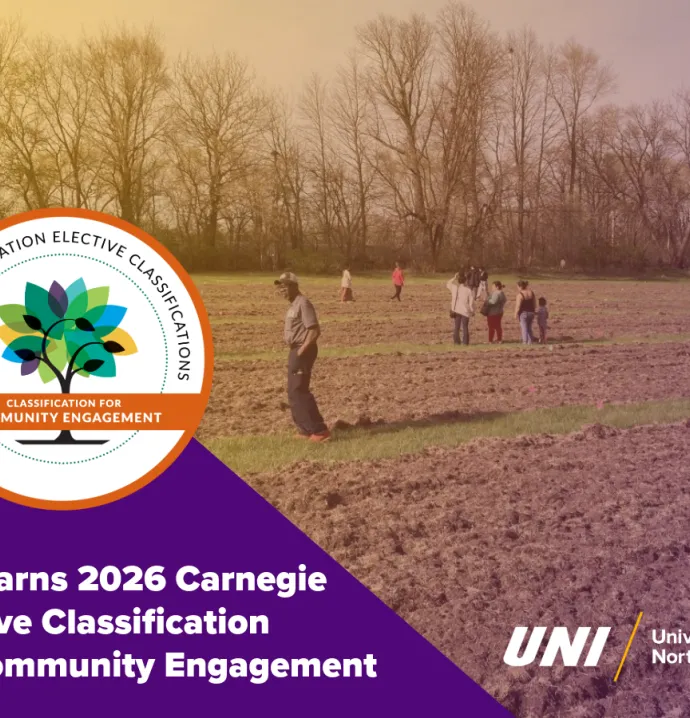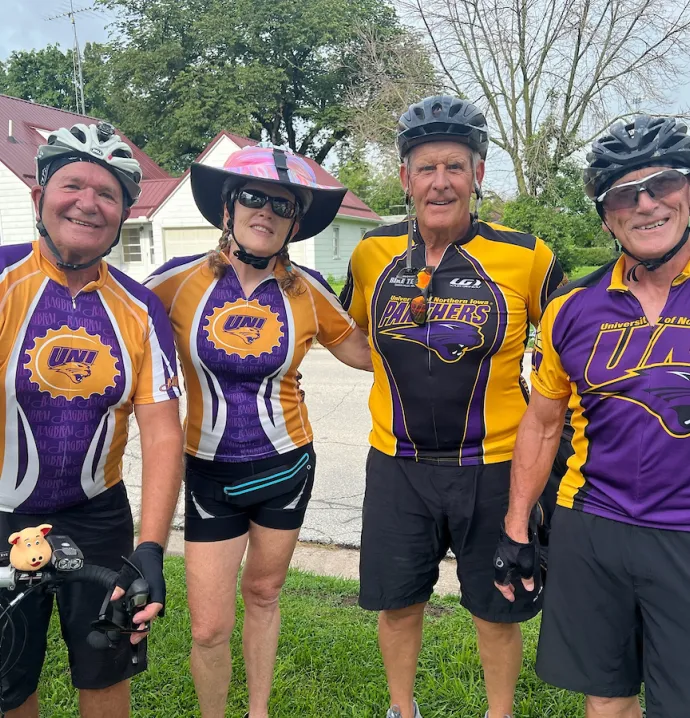Local leaders discuss race, policing and social justice at UNI panel
Local leaders discuss race, policing and social justice at UNI panel
Last week, a panel discussion on the intersection of race, policing and social justice was held virtually as part of UNI’s “Cultivating Justice: A 6-Week Quest Toward Racial Equity” series. The series, now in its fourth year, was launched in 2015 in the wake of demonstrations after the police shooting death of Michael Brown in Ferguson, Missouri.
Moderated by Ashleigh Kysar-Moon, an assistant professor of sociology, the discussion was between Waterloo Police Chief Joel Fitzgerald, Criminology Professor Gayle Rhineberger and Ryan Stevenson, a congressional staff worker, local activist and UNI graduate. The selected highlights below were edited for clarity. The complete conversation is online.
Police reform since 2015:
Stevenson: What has changed is that, with the advancements of technology and uses of camera phones, what has long been the Black experience is becoming visualized for everyone daily. When we passed the More Perfect Union this summer, Iowa was one of three states to actually pass police reform legislation at the time. To me, nothing has changed outside of that. We can look at police departments like Minneapolis, right? A lot of things were within their policies already. Regardless of policy, if the culture is still there, if there's still really no penalties for misconduct and brutality, then it continues to breed a culture of “Hey, I can get away with it.”
Fitzgerald: I have more of an agreement with Ryan than a response. You see, so many leaders shy away, retire and do not have the courage to confront some of the things that Ryan spoke about. We have problems within our industry. And it truly takes a great amount of courage to come into an organization and promote the kind of cultural shift, the paradigm shift that you need to create the culture of accountability. You're seeing a newer generation of leaders, especially since 2015, who are willing to step up, willing to assist with reform, willing to create policy and back that policy with action. With that, it shouldn't necessarily be seen as an attack on policing, it should be seen as a movement towards shaping policing.
Rhineberger: In some ways, nothing has changed, as Ryan has said, and in other ways, there are clearly some things that have changed or appear to have changed. We are having more intentional conversations than we did five years ago in policing and in the community and in education. I think that's a part of the stepping-stone process of getting us to a better place than where we have been. But, in the end, policies exist. We know policies exist. But if you don't really believe in that policy or that everyone follows it, then it doesn't actually do any good.
“Defunding” the police:
Rhineberger: It’s important to know that there is no uniform definition of defunding. And that's not a new concept. Neither reform nor defunding are new concepts. They've just come to the forefront in the last couple of months. I'm a strong supporter of police reform, I care about my students going into policing, I care about my students of color, who are not going into policing and who are, because of the color of their skin, at more risk of being brought into the criminal justice system.
Stevenson: We talked about reallocating funds. If we talk about reallocating funds like Dr. Rhineberger said versus reallocating funds to be most beneficial for the people, what are we doing to protect and serve the community as a whole? A lot of times officers are like, “Why am I responding to this? This is not something that I'm trained for.” For example, police officers shouldn't be firefighters. Firefighters should be worried about fighting fires, and police officers should be worried about keeping the community safe. I know people that have issues with their children and are calling the police. And it can be a lot of different things. But is that officer supposed to be a family mediator? No, I don't think so.
Fitzgerald: I can totally agree that a reallocation search for funding has to happen. Policing has become the Swiss Army knife of social services. It is truly beyond the grasp of most young police officers to go into situations as Ryan just cited. The person that comes to a scene of someone who is mentally ill inside of their own home, that threatens to take their life and they're the only person inside that house. You know, do we kick their door in and then go in and create a situation where that person is killed? We put ourselves in a situation where the person wants to do suicide by cop. I don't want any of my police officers put into those situations where they're ill-equipped to deal with those things. That's where good policy and good leadership comes in. I do think we need civilians to be able to respond to those events.
The role of public education in addressing racial inequality:
Stevenson: I think it starts with our education system and being honest and true in the classroom. My mother's a teacher, my daughter's mother is a teacher, and I understand the weight and the pressure that teachers are under right now. I think there's only so much that you can place on individuals in the classroom to correct the ills of our country. There's a lot of things that I tell my children to do, and they might do it, or they might not. But I know that they're watching what I do more than anything. They know that I'm involved in the community, they know that I'm speaking out about the issues and that I'm passionate about it. And those are the things I know they really hold on to.
Rhineberger: Everything Ryan said is absolutely correct. We are socialized from the time we're little. You're not born to be anything, you are socialized to be something. There is a CD or a record of your entire socialization in your head. And you cannot control the images, the thoughts, the ideas that come to your brain, you can't do it. You can control what you do with that information. So, you can choose to let the information that came from racist relatives, continue to influence you and who you are. Or you can stop it and say, “I recognize that thought, I know what it is, and I can do something to change it.” Having a thought in and of itself doesn't make you racist, classist, sexist ... what you do with that information does. Once you recognize it, it's a choice.
Fitzgerald: I do think there is a place for race-based history to be provided for kids at a very early age. I do not think this conversation should be shied away from. I do remember learning about slavery and learning about other things. I don't remember learning about, let's say, Juneteenth. So, it's been a selective bit of history that we allowed to be facilitated to students, at least when I was growing up. We may need to ensure that kids are getting the kind of holistic education they need.




